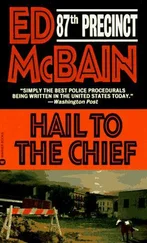Parker sighed, threw the curtain back, and went into the other room.
“What do you think?” Willis asked the assistant medical examiner.
“Fell or was pushed from someplace up there,” the M.E. said. “Split his skull wide open when he hit the ground. Probably dead on impact.”
“Anything else?”
“What more do you want? You’re lucky we haven’t got an omelet here.” He snapped his bag shut, rose from where he was crouched beside the body, and said, “I’m finished, you can do what you like with him.”
“Thanks, Al,” Willis said.
“Yeah,” the M.E. answered, and walked off.
The body was now lying on its back. Genero looked down at the open skull and turned away. Dennison, the building superintendent, walked over with his hands in the pockets of his bib overalls. He looked down at the boy’s bloody face and nodded.
“That’s the kid in 4C,” he said.
“What’s his name?”
“Scott.”
“That the first name or the last?”
“The last. I got his first name written down someplace inside. I got all the tenants’ names written down. You want me to look it up for you?”
“Would you, please?”
“Sure,” Dennison said.
“Would that be 4C up there?” Willis asked. “The apartment with the broken window?”
“That’s it, all right,” Dennison said.
The telephone on Arthur Brown’s desk was ringing. He lifted the receiver, tucked it between his shoulder and his ear, said, “Eighty-seventh Squad, Detective Brown,” and then glanced toward the slatted rail divider, where a patrolman was leading a handcuffed prisoner into the squadroom.
“Is this a detective?” the woman on the telephone asked.
“Yes, ma’am, Detective Brown.”
“I want to report a missing person,” the woman said.
“Yes, ma’am, just one second, please.”
Brown opened his desk drawer, took out a block of wood to which was attached the key to the detention cage across the room, and flipped it to the patrolman, who missed the catch. The prisoner laughed. The patrolman picked up the key, led the prisoner to the cage, opened the grillwork door, and shoved him inside.
“Take it easy, man,” the prisoner warned.
The patrolman locked the cage door without answering him. Then he walked to Brown’s desk and sat on the edge of it, tilting his peaked cap back on his forehead and lighting a cigarette. On the telephone, Brown was saying, “Now, what’s your name, please, ma’am?”
“Mary Ellingham. Mrs. Donald Ellingham.”
“Would you spell that for me, please?”
“E-L–L...”
“Yep...”
“...I-N-G, H-A-M.”
“And your address, Mrs. Ellingham?”
“742 North Trinity.”
“All right, who’s missing, Mrs. Ellingham?”
“My husband.”
“That his full name? Donald Ellingham?”
“Yes. Well, no. Donald E . Ellingham. For Edward.”
“Yes, ma’am. How long has he been gone?”
“He was gone a week this past Friday.”
“Has this ever happened before, Mrs. Ellingham?”
“No. Never.”
“He’s never been gone before? Never any unexplained absences?”
“Never.”
“And you say he’s been missing since, let’s see, that’d be Friday the ninth?”
“Yes.”
“Did he go to work on Monday morning? The twelfth?”
“No.”
“You called his office?”
“Yes, I did.”
“And he wasn’t there.”
“He hasn’t been there all week.”
“Why’d you wait till today to report this, Mrs. Ellingham?”
“I wanted to give him a chance to come back. I kept extending the deadline, you see. I thought I’d give him a few days, and then it turned into a week, and then I thought I’d give him just another day, and then Saturday went by, and... Well, I decided to call today.”
“Does your husband drink, Mrs. Ellingham?”
“No. That is, he drinks, but not excessively. He’s not an alcoholic, if that’s what you mean.”
“Has there ever been any problem with... well... other women?”
“No.”
“What I’m trying to say, Mrs. Ellingham—”
“Yes, I understand. I don’t think he’s run off with another woman, no.”
“What do you think has happened, Mrs. Ellingham?”
“I’m afraid he’s been in an accident.”
“Have you contacted the various hospitals in the city?”
“Yes. He’s not at any of them.”
“But you still think he may have been in an accident.”
“I think he may be dead someplace,” Mrs. Ellingham said, and began weeping.
Brown was silent. He looked up at the patrolman.
“Mrs. Ellingham?”
“Yes.”
“I’ll try to get over there later today if I can, to get the information I’ll need for the Missing Persons Bureau. Will you be home?”
“Yes.”
“Shall I call first?”
“No, I’ll be here all day.”
“Fine, I’ll see you later, then. If you should hear anything meanwhile—”
“Yes, I’ll call you.”
“Good-bye, Mrs. Ellingham,” Brown said, and hung up. “Lady’s husband disappeared,” he said to the patrolman.
“Went down for a loaf of bread a year ago, right?” the patrolman said.
“Right. Hasn’t been heard from since.” Brown gestured toward the detention cage. “Who’s the prize across the room?”
“Caught him cold in the middle of a burglary on Fifth and Friedlander. On a third-floor fire escape. Jimmied open the window, and was just entering.”
“Any tools on him?”
“Yep. I left them on the bench outside.”
“Want to get them for me?”
The patrolman went out into the corridor. Brown walked over to the detention cage. The prisoner looked at him.
“What’s your name?” Brown asked.
“What’s yours?”
“Detective Arthur Brown.”
“That’s appropriate,” the prisoner said.
“I find it so,” Brown said coolly. “Now what’s yours?”
“Frederick Spaeth.”
The patrolman came back into the room carrying a leather bag containing a hand drill and bits of various sizes, a jimmy, a complete set of picklocks, several punches and skeleton keys, a pair of nippers, a hacksaw, a pair of brown cotton gloves, and a crowbar designed so that it could be taken apart and carried in three sections. Brown looked over the tools and said nothing.
“I’m a carpenter,” Spaeth said in explanation.
Brown turned to the patrolman. “Anybody in the apartment, Simms?”
“Empty,” Simms replied.
“Spaeth,” Brown said, “we’re charging you with burglary in the third degree, which is a felony. And we’re also charging you with possession of burglar’s instruments, which is a class-A misdemeanor. Take him down, Simms.”
“I want a lawyer,” Spaeth said.
“You’re entitled to one,” Brown said.
“I want him now. Before you book me.”
Because policemen are sometimes as confused by Miranda-Escobedo as are laymen, Brown might have followed the course pursued by his colleague Kling, who, the night before, had advised a prisoner of his rights even though cruising radio patrolmen had arrested him in the act. Instead, Brown said, “What for, Spaeth? You were apprehended entering an apartment illegally. Nobody’s asking you any questions, we caught you cold. You’ll be allowed three telephone calls after you’re booked, to your lawyer, your mother, your bail bondsman, your best friend, whoever the hell you like. Take him down, Simms.”
Simms unlocked the cage and prodded Spaeth out of it with his nightstick. “This is illegal!” Spaeth shouted.
“So’s breaking and entry,” Brown answered.
The woman in the apartment across the hall from 4C was taller than both Willis and Genero, which was understandable. Hal Willis was the shortest man on the squad, having cleared the minimum five-feet-eight-inch height requirement by a scant quarter of an inch. Built like a soft-shoe dancer, brown-haired and brown-eyed, he stood alongside Genero, who towered over him at five feet nine inches. Hal Willis knew he was short. Richard Genero thought he was very tall. From his father, he had inherited beautiful curly black hair and a strong Neapolitan nose, a sensuous mouth, and soulful brown eyes. From his mother, he had inherited the tall Milanese carriage of all his male cousins and uncles — except Uncle Dominick, who was only five feet six. But this lady who opened the door to apartment 4B was a very big lady indeed. Both Willis and Genero looked up at her simultaneously, and then glanced at each other in something like stupefied awe. The lady was wearing a pink slip and nothing else. Barefooted, big-breasted, redheaded, green-eyed, she put her hands on her nylon-sheathed hips and said, “Yeah?”
Читать дальше












